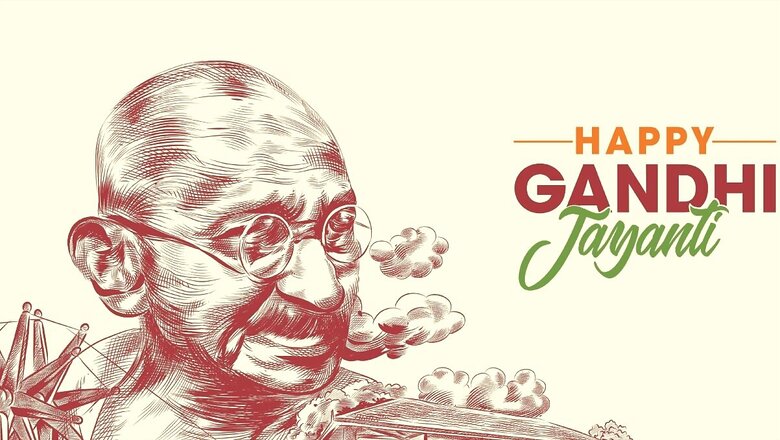
views
Every year on October 2, people celebrate Gandhi Jayanti, a holiday honouring the birth date of Mahatma Gandhi, the Father of the Nation. It is a national holiday. Mahatma Gandhi, born in 1869, rose to prominence as a leader of the Indian independence struggle against British rule. He believed that the best way to bring about political and social change was through nonviolent civil disobedience.
Millions of people worldwide have been inspired by his ideas and teachings, making him a crucial figure in India’s fight for independence. The day also highlights the significance of the Swachh Bharat Abhiyan, or Clean India Campaign, which reflects Gandhi’s belief that sanitation and hygiene are essential components of both individual and collective well-being.
To honour the legacy of Mahatma Gandhi, various celebrations and events are held across the country on Gandhi Jayanti. Schools, colleges, government agencies, and other institutions organise special programmes to commemorate his life and teachings. Additionally, many students participate in speech and debate competitions to honour and promote Gandhiji’s moral values and nonviolent principles.
Gandhi Jayanti 2024: Speech ideas for students
10-Line Speech on Mahatma Gandhi
- Good morning, esteemed principal, teachers, and dear friends. Today, we commemorate the birth anniversary of Mahatma Gandhi, the Father of our Nation.
- On October 2, 1869, Mohandas Karamchand Gandhi was born in a village near Porbandar, Gujarat.
- His mother’s name was Putlibai Gandhi, and his father was Karamchand Gandhi.
- Kasturba Gandhi was the wife of Gandhiji.
- Bapu is regarded as a global hero for his unwavering integrity and nonviolence.
- He was a brilliant leader, philosopher, social reformer, and one of India’s greatest freedom fighters.
- Gandhiji employed nonviolent tactics such as civil disobedience and Satyagraha to lead India to Independence.
- He inspired millions of Indians to adopt nonviolence as a weapon in their struggle for rights and freedoms.
- On January 30, 1948, Mahatma Gandhi was assassinated.
- Let us commit to practising ahimsa—being truthful and kind to everyone—on the anniversary of his birth.
Short Speech on Gandhi Jayanti (200 words)
Good morning, esteemed principal, respected teachers, and dear friends.
On this momentous occasion of Gandhi Jayanti, we gather to honour Mohandas Karamchand Gandhi. Gandhiji, the Father of the Nation, was born on October 2. He was a remarkable man who harnessed the power of truth and nonviolence to alter the course of history.
Gandhi Jayanti is a day for reflection as well as celebration. It serves as a reminder of the values that Gandhiji upheld, including nonviolence, compassion, peace, and the unwavering pursuit of truth. His life exemplifies how nonviolence can effect meaningful change, even in the face of oppression and injustice.
As we celebrate this day, let us remember his sacrifices and the hardships he endured to secure India’s freedom. Gandhiji’s steadfast commitment to truth and nonviolence has inspired civil rights and liberation movements worldwide. His legacy endures as a testament to the power of nonviolent resistance in effecting significant change in our complex and volatile world.
Let us pledge to uphold the principles that Gandhi cherished and strive for a society where justice, equality, and non-violence prevail on this Gandhi Jayanti. Happy Gandhi Jayanti to all!
Satyameva Jayate!
Long Speech on Gandhi Jayanti (300-350 words)
Good morning to our respected principal, teachers, and dear friends.
We’ve gathered to commemorate Mahatma Gandhi’s birth anniversary. Born in 1869 in Porbandar, Gujarat, today marks the 155th birthday of Mohandas Karamchand Gandhi, recognised as the “Father of the Nation” for his contributions to India’s freedom struggle. We affectionately refer to him as ‘Bapu.’ He dedicated his life to India’s freedom, employing the powerful tool of “Nonviolence.”
In 1888, he graduated from law school in the United Kingdom and then moved to South Africa to begin practising law. Upon returning to India, he launched the Satyagraha, or civil disobedience movement. In his quest to liberate India from British oppression, he practised ahimsa, or non-violence.
To promote Indian culture, Gandhiji wore a khadi dhoti. His message was to fight for one’s rights and to believe in oneself. Initiating the Non-Cooperation Movement, he urged Indians to strive for independence rather than collaborate with the British. Gandhiji devoted a significant part of his life to the Indian liberation movement alongside Gopala Krishna Gokhale.
Gandhiji was imprisoned multiple times during this struggle. Among the significant movements he led were the Non-Cooperation, Civil Disobedience, and Quit India movements. To challenge the British salt monopoly, he initiated the 400-kilometre Dandi March, also known as the Salt Satyagraha, in 1930. The Quit India movement called for the withdrawal of British forces from India.
Gandhiji achieved a great deal during his lifetime, and his accomplishments continue to inspire people today. He devoted his life to promoting Swaraj and fighting against untouchability, advocating for women’s rights and farmers’ financial security. His commitment and perseverance ultimately led to India’s independence after 200 years of British colonial rule.
Every year at Delhi’s Raj Ghat, we commemorate Gandhi Jayanti. Our President and Prime Minister gather at his samadhi to present flowers as a sign of respect. In his honour, his favourite song, “Raghupati Raghav Raja Ram,” is sung. On this day, all government offices, private offices, colleges and schools are closed.


















Comments
0 comment